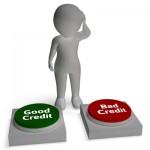How Credit Really Works
 Anytime you obtain a credit card or bank loan, you are taking out credit. Each time you apply for credit, the lender will check your credit report to determine your ability or likelihood to repay the loan.
Anytime you obtain a credit card or bank loan, you are taking out credit. Each time you apply for credit, the lender will check your credit report to determine your ability or likelihood to repay the loan.
Since your credit report will determine whether you receive a loan or credit card, it is important to understand what a credit report is and what information is included in this report. This will help you maintain a higher credit score that allows you to get better loans with lower interest rates.
What Information is Listed in a Credit Report?
Credit reporting agencies collect all of your pertinent credit information and list the details in a special credit report. When you apply for a loan or credit account, you give the lender permission to access your credit report. Before applying for credit, you should be aware of what information is listed on your credit report. Here is a look at the basic facts included in every person’s credit report.
- Personal Information. The credit report will include some of your basic personal information, such as your full name, date of birth, past and current employers, past and current address, and your driver’s license information.
- Current Loans. The report will also list all of the current loans and credit accounts you have. It will list the full amount of the loan and how much you still owe on the loan.
- List of Co-Applicants. If you have obtained any loans with a co-applicant, the credit report will also list the names of anyone else on the account with you.
- Continuing Credit Accounts. Any account you have that offers continuing credit, such as credit cards, will also be listed on the report.
- Third-Party Inquiries. The credit report will also include a complete listing of every lender who has accessed your credit report over the past five years.
- Credit Applications. The report will also include a listing of all the different places you have applied for a credit card or loan, whether or not your credit application was approved.
- Default Accounts. Your credit report will include any credit account that you have that you have defaulted on or not paid in full. This may include any payment that is more than 60 days past due. This could include loans, a mortgage, credit cards, or utility bills.
- Accounts Brought Current. If you had a default account that you have now paid up-to-day or paid off in full, this information will also be listed on the report.
- Payment Agreements. If you have defaulted on a loan or credit account, but have now entered into a payment agreement with the lender, this information will be included in your credit report.
- Repayment History. Beginning in March 2014, your credit report will also include information about your repayment history. The report will include basic repayment information for each credit account, such as the due date, date payment was made, and any missed payments.
How Are Defaults Reported?
Default payment may be the most damaging part of your credit report. It is important that you understand how default accounts are reported and how to avoid having this marked on your account. A creditor can only report this information on your credit report if they cannot get a hold of you at your last known address or if your account is in arrears by more than 60 days. The creditor must also notify you either in person or by mail that you owe the debt and how much you owe. The creditor must also tell you that they may report your default to the credit reporting agencies, but this is typically part of your credit application.
How Long Does the Information Remain?
All of the information on your credit report will remain intact for a period of five years, or seven years for closeouts. Unless there is a factual error there really is no way to remove this credit information from your account. However, your information can and will be updated as you make payments and enter into payment agreements.
Check for Errors
It is important that you take the time to check your credit report on an annual basis. You should completely look over your credit report for any errors. Make sure that all of your personal information is correct and that all your loans and credit accounts and balances are correct. If you think there are any errors with your personal information, you should contact the credit reporting agency directly to make the necessary changes. If there is an error with one of your loans or credit accounts, contact the creditor and ask them to make the necessary changes. If you are unhappy with their response, you can contact Ombudsman and ask for their assistance in fixing your credit report. They will work with your creditor to come to a mutual agreement on your credit information and make sure any errors are corrected on your credit report.
Image courtesy of Stuart Miles / FreeDigitalPhotos.net

